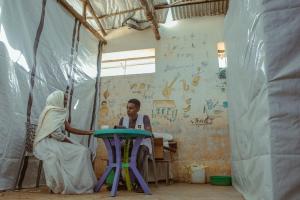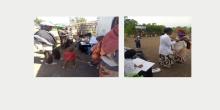Bridging Gaps in Health and Nutrition Services for IDPs and Crisis-Affected Communities in Amhara, Ethiopia
Since November 2021, in Amhara region of Ethiopia has faced a severe humanitarian crisis. This crisis is driven by internal armed conflict, multiple disease outbreaks, and the adverse effects of climate change, leading to both drought and floods. The situation has further deteriorated with an upsurge of cross-border influx due to conflict in the neighboring Sudan. Consequently, nearly a million internally displaced persons (IDPs) are scattered across 38 collective sites and host communities, alongside hundreds of thousands of refugees and returnees (Amhara Public Health Institute, SITREP #155, June 15, 2024).
The ongoing public health emergencies have exacerbated the already critical demand for basic essential health and nutrition services. The availability and access to these services, especially for the IDPs, have been severely limited. To address this urgent need, the World Health Organization (WHO), in collaboration with regional government authorities, has deployed Mobile Health and Nutrition Teams (MHNTs) to bring essential services to the most vulnerable populations.
In response to the escalating crisis, WHO and its partners provided operational and technical support to the Amhara Region Health Bureau and the Public Health Institute to deploy 10 MHNTs from March 2022 to March 2024. As the conflict intensified and the number of IDPs increased, the number of MHNTs was expanded to 19 in April 2024. This expansion was made possible through funding from the European Commission humanitarian Aid, the United States Agency for International Development, the United Nations Central Emergency Response Fund , and the People and Government of Japan.
These 19 MHNTs, consisting of 132 healthcare workers, were strategically deployed to selected locations at the IDP sites to provide essential health services. The teams operated under the direct supervision of the Public Health Institute of the region, covering zones such as North Shewa, North Wollo, South Wollo, Waghimra, and Oromo Special Zone. These areas were prioritized based on the high concentration of IDPs and the impact of drought and floods.
Each MHNT comprised a multidisciplinary team including a clinician, nurses trained in nutrition, a laboratory technician, a logistician/pharmacist, an environmental health officer, a psychiatric nurse, a psychosocial worker, a health educator, and a community mobilizer. The teams were equipped to provide a wide range of services, from primary healthcare to mental health support, immunizations, and nutritional care.
The impact of the MHNTs has been significant. Over the period of their deployment, the teams have provided more than 124,250 medical consultations, including referrals for patients requiring specialized care. Integral to their services was the provision of mental health and psychosocial support and first-line assistance for victims of gender-based violence. The MHNTs also delivered essential primary healthcare services, immunizations, nutritional support for maternal and child health, and emergency care for communicable and non-communicable diseases.
Meaza, a young mother from the Raya Alamata district, was forced to flee her home due to conflict. In a makeshift camp, she had little hope of accessing the healthcare needed for her newborn. The arrival of an MHNT was a turning point. Meaza received critical medical care for her baby and support and counselling for herself, which significantly improved her situation.
Tadesse, an elderly farmer from the West Armachiho district, saw his chronic illness deteriorate due to the collapse of local healthcare services. The MHNTs reached his village, providing the medications and care he had been deprived of. For Tadesse, this wasn't just about receiving healthcare—it was a lifeline that allowed him to continue supporting his family.
WHO's efforts extend beyond immediate support. Recognizing the need for sustainable solutions, WHO has provided essential medical supplies, including Interagency Emergency Health Kits (IEHK), Measles kits, non-communicable disease kits, and supplies for managing severe acute malnutrition (PED-SAM) to both MHNTs and nearby health facilities serving as referral sites. These additional supplies played a pivotal role in addressing the gaps in essential medicines due to disruptions in the national supply chain.
Training and capacity building of the health workforce have also been central to WHO's strategy. Over the past two years, 265 healthcare workers have been trained in essential health and nutrition service packages. This training wasn't limited to WHO-supported teams but also included staff from other local and international non-governmental organizations. This collaborative approach ensures a broader network of healthcare providers capable of delivering vital services under the most challenging circumstances.
As the Amhara region continues to grapple with its complex emergencies, WHO remains steadfast in its commitment to supporting the health and well-being of its people. The 19 MHNTs are currently in the hardest-hit zones, providing thousands of weekly consultations and addressing the ongoing cholera outbreak, among other health emergencies. The challenges are far from over, underscoring the continued need for support and resources to sustain these life-saving efforts.
In conclusion, the deployment of MHNTs has been a critical intervention in bridging the gaps in health and nutrition services for the IDPs and crisis-affected communities in Amhara. Their work highlights the importance of timely and coordinated responses in addressing humanitarian crises and ensuring the health and well-being of vulnerable populations.
Technical contact
Dereje Tadesse
Medical Officer - Nutrition
tadessed [at] who.int (tadessed[at]who[dot]int)




